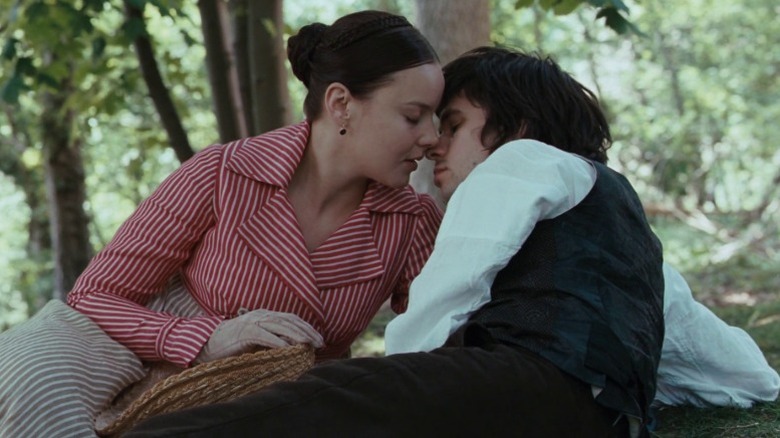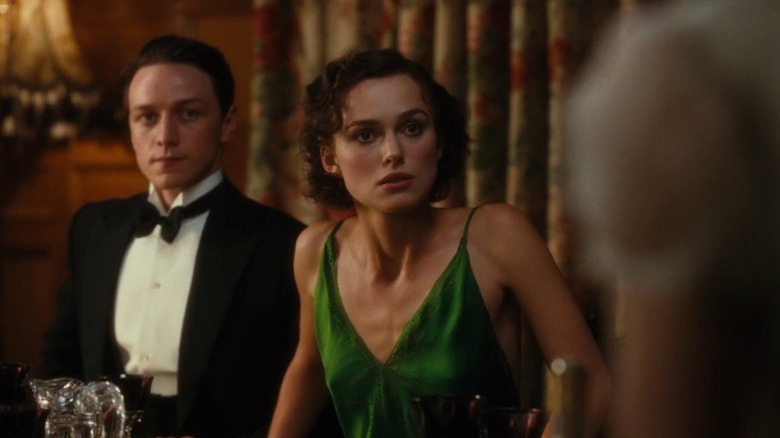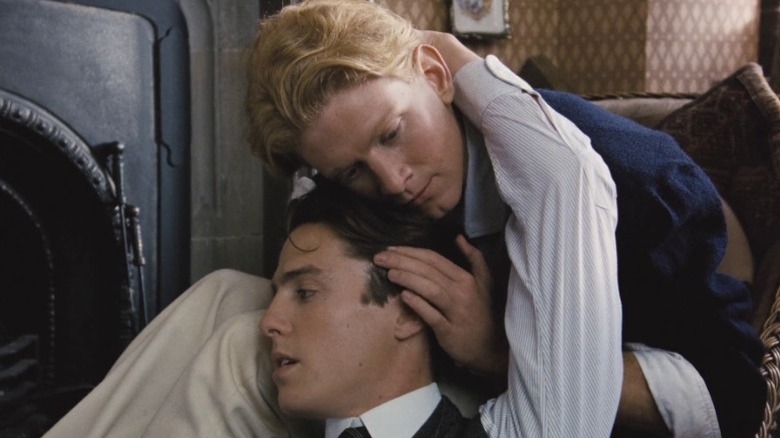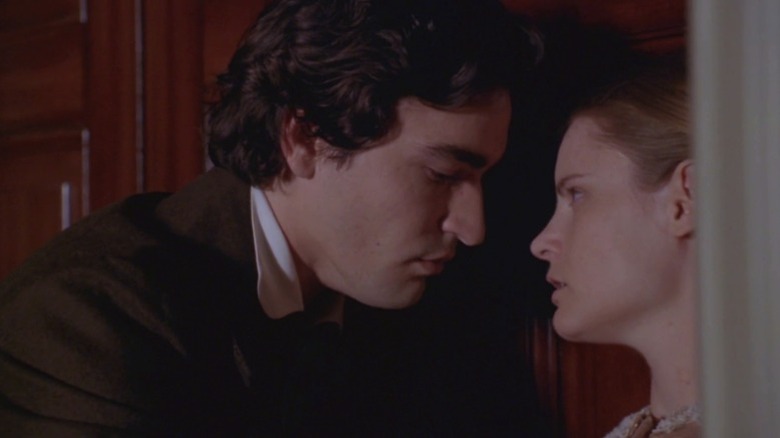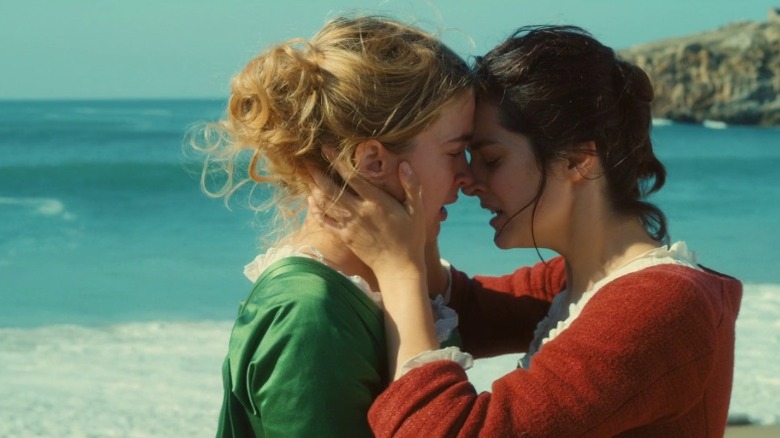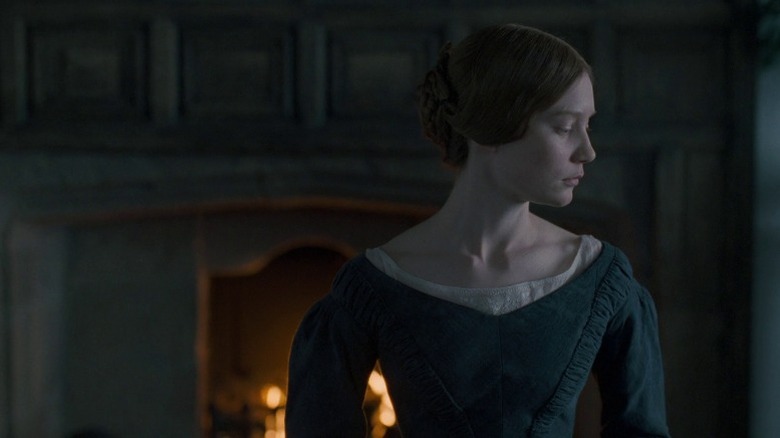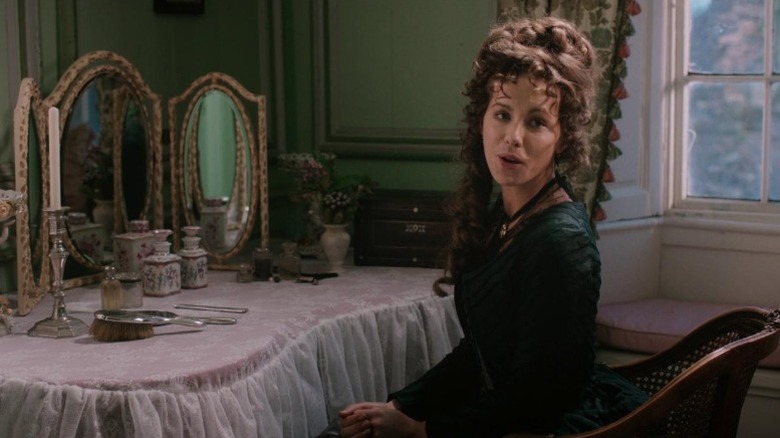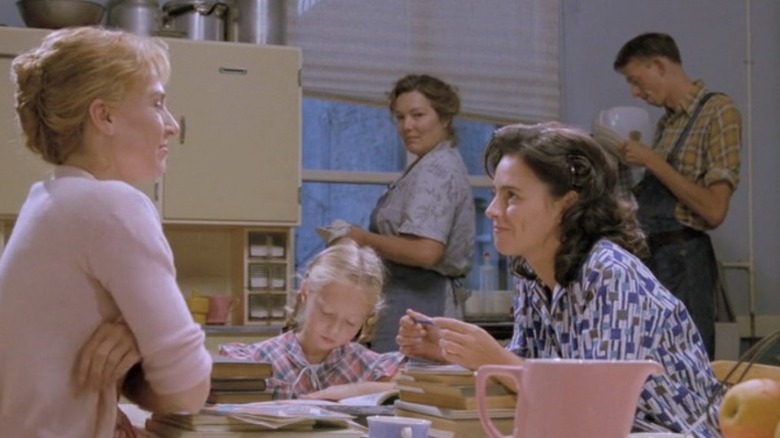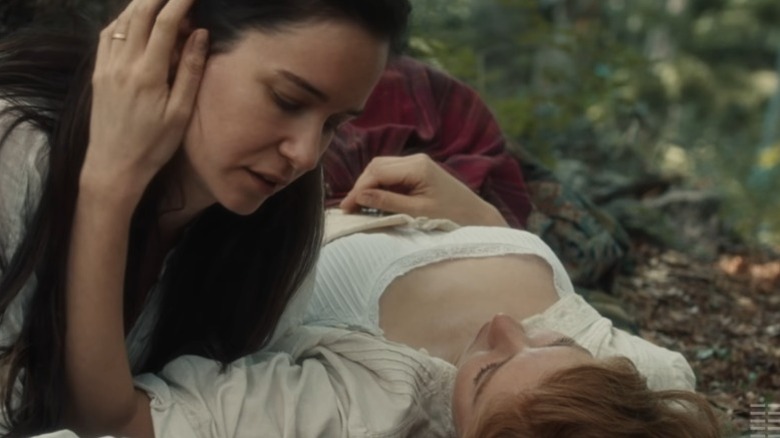25 Movies Like Pride & Prejudice You Need To Watch Next
We may receive a commission on purchases made from links.
"Pride and Prejudice" is the kind of novel that feels modern no matter when it's read, but Jane Austen herself died in 1817, more than 70 years removed from the invention of motion pictures. In other words, she probably could never have imagined that, hundreds of years in the future, there would be so many recorded dramatic adaptations of her most celebrated work — nor that one of them, 2005's "Pride & Prejudice," would be able to capture its spirit so brilliantly as to renew passion for the story of Elizabeth Bennet (Keira Knightley) and Mr. Darcy (Matthew Macfadyen) for a whole generation.
Arguably the best Jane Austen adaptation, that Deborah Moggach-scripted, Joe Wright-directed take on the novel was so perfect — so impeccably attentive to the sharp social observation, the warm family dynamic, the richness of local and temporal texture, and the soul-stirring romanticism of the source material — that it interrupted a cycle of decades of periodic screen adaptations of "Pride and Prejudice." Save for looser, unorthodox adaptations like "Fire Island" and "Pride and Prejudice and Zombies," no other film or TV director has dared touch Austen's masterpiece since.
If you count yourself as one of the many ardent fans of Wright's "Pride & Prejudice," but you feel like putting on something new instead of rewatching it for the 100th time (not that there's anything wrong with that), fret not: Here, we've compiled a list of other movies like "Pride & Prejuice" that you can watch next.
Bright Star
Jane Campion is one of cinema's most adroit chroniclers of the archeology of love and its secret nooks and crannies. With a filmmaking method that comes down to tenderness, her period films engage in such intimate, unflinching observation of the forms taken on by intimacy and desire in bygone eras that watching them almost feels like becoming privy to new, once-hidden dimensions of human history. On top of that, of course, Campion is a master stylist who knows how to infuse even her darkest and thorniest films with stark, overwhelming beauty. As a result, you could pluck any title from her catalog of costume dramas and it would probably make a great "Pride & Prejudice" companion — but no film would fit that bill more perfectly than "Bright Star."
This 2009 film dramatizes the doomed but deeply loving relationship between trailblazing early-19th-century Romantic poet John Keats (Ben Whishaw) and Fanny Brawne (Abbie Cornish). In locating the physical, sensual, and historical components of their blossoming attraction and emotional entanglement, Campion emphasizes both Keats' aching writing and Brawne's less famous but equally soulful work designing and sewing dresses. Both lovebirds' vehicles of creative expression become canvases for their ardent yet delicate emotions as they surrender to a love made challenging by Keats' poor financial standing and then by his ailing health. It's a gut-wrenching yet swooningly beautiful and immaculately designed period romance, full of little Campion-ian dashes of life and authenticity that make it linger in the mind.
Wuthering Heights (2011)
Much like Jane Austen's "Pride and Prejudice," Emily Brontë's "Wuthering Heights" could be described as a standard of romance literature. Even so, it is not exactly a proper romance novel in the strictest sense. It's appropriate, then, that it was the source material chosen by English maverick filmmaker Andrea Arnold to make a movie that twists and subverts the conventions of the standard period romance film. Arnold's 2011 take on "Wuthering Heights" is not only the best cinematic adaptation of Brontë (sorry, Laurence Olivier), but it's also one of the essential films for anyone who's captivated by the ebb and flow of costume dramas — not least because it adds something wholly unusual and original to that genre.
Dark, somber, moody, and enveloped in gauzy humidity and lurid sensation — like any "Wuthering Heights" adaptation worth its salt should be, yet so few bother — Arnold's film stars James Howson as Heathcliff, the brooding young man who's adopted from the streets of Liverpool into the Earnshaw family on the Yorkshire moorlands, and Kaya Scodelario as his foster sister and eventual lover Catherine. The script focuses on Catherine and Heathcliff's youth and makes some bold deviations from the source material, but regardless of its stricto-sensu narrative faithfulness, the movie — with its trademark Arnold blend of raw handheld shooting and utterly breathtaking visual composition — cuts right to the heart of Gothic fiction as an uneasy yet spellbinding interplay between tenderness and brutality.
Atonement
Before his career veered in the direction of stuffy Oscar bait biopics like "Darkest Hour" and goofy, derivative thrillers like "The Woman in the Window," there was a period of time in which it really looked like Joe Wright might be single-handedly reinventing period dramas for the 21st century. His note-perfect, miraculously fresh "Pride & Prejudice" was an auspicious enough breakthrough, but then came "Atonement," in which Wright once again got everything right that he'd gotten in his previous film — and this time laced it all with a stunning degree of risk and unwieldiness.
Adapted from a brilliant Ian McEwan novel, "Atonement" is a grand tragedy of ravenous yearning against the grain of history. If you're a fan of Keira Knightley's Elizabeth Bennet, you owe it to yourself to see what she does with Cecilia Tallis, an equally complex yet even more tortured character whose love for Robbie Turner (James McAvoy) is faced with even greater moral and societal hurdles; this is arguably the best Keira Knightley movie. Wright captures the stifling horrors of the film's 1930s-40s setting as keenly as he does the youthful brio of Jane Austen's Regency-era England in "Pride & Prejudice," visualizing the novel's chain of disastrous events with a punchy intensity usually reserved for thrillers — with help from 12-year-old Saoirse Ronan giving one of the most incredible child performances in film history.
Sense and Sensibility (1995)
Another great Jane Austen film adaptation with a modern, effervescent feel is the 1995 version of "Sense and Sensibility" — still, to date, the only straightforward theatrical film adaptation of Austen's eponymous 1811 novel. Much like "Pride & Prejudice," "Sense and Sensibility" trains its focus on sisterly relationships in a family of landed gentry, and the tensions between love and financial necessity epitomized in the institution of marriage. But it's even more overt about the class angle, making it the whole crux of the story, which doesn't subtract one bit from either the novel or the movie's romanticism.
In fact, "Sense and Sensibility" is the kind of literary adaptation that gives off the feeling of everybody involved working hard to get everything right. With a script by then-first-timer Emma Thompson and sparkling direction from early-period Ang Lee, the movie takes liberties with the novel yet captures its spirit as best it can be captured. It's impossible to watch it and not be fully enchanted by the dynamic between sisters Elinor (Thompson) and Marianne Dashwood (Kate Winslet), nor by the one between them and their respective suitors Edward Ferrars (Hugh Grant) and Colonel Brandon (Alan Rickman). As the sisters find themselves suddenly impoverished and in urgent need of marriage as a pathway to financial stability, the movie somehow finds ways to translate the brutal realities and complex negotiations demanded by the 19th-century English class system into perfect crowd-pleasing entertainment.
Little Women (2019)
Greta Gerwig's "Little Women" is, of course, one of the defining examples of emotionally charged, female-centric costume drama made in the past decade, which might account for why it shares a fair number of fans with Joe Wright's "Pride & Prejudice." Assuming you're not already in that Venn diagram, then you definitely owe it to yourself to give a watch to Gerwig's hugely popular take on the Louisa May Alcott novel.
Critically acclaimed, nominated for six Academy Awards, and financially successful to the tune of $220 million worldwide, the 2019 film follows in the footsteps of all "Little Women" adaptations in telling the story of the March sisters — Jo (Saoirse Ronan), Margaret (Emma Watson), Amy (Florence Pugh), and Beth (Eliza Scanlen) — along with their mother Marmee (Laura Dern). The sheer perfection of that ensemble extends to every other creative decision in the film, including a nonlinear structure that allows Gerwig and editor Nick Houy to move freely about the text for maximum emotional impact. Gerwig deals with the conundrum of tackling a potentially "redundant" oft-remade project by investing enormous thought and care into every detail, fashioning a film that feels like the platonic audiovisual translation of Alcott's trailblazing coming-of-age tapestry.
Little Women (1994)
The only real problem with Greta Gerwig's 2019 adaptation of Louisa May Alcott's "Little Women" is that it became so massively popular as to all but eclipse Gillian Armstrong's equally excellent, equally modern-feeling, equally star-studded 1994 version among younger generations. So let this list be your incentive to also seek out the 1994 "Little Women" — not just as an alternative interpretation of the novel but as a perfect introduction to Gillian Armstrong.
Armstrong is, after all, a filmmaker whose work is sure to feel not just appealing but outright foundational for any fan of "Pride & Prejudice." In her movies, such as "My Brilliant Career" and "Mrs. Soffel," she helped codify and consolidate our contemporary understanding of the period drama film and its wide range of potential avenues for beauty, romanticism, and layered humanist storytelling.
"Little Women" is an especially fascinating showcase of Armstrong's talent because, out of all her films in the genre, it is arguably the simplest and least showy, yet also the most affecting, crafting a cozy sisterly nest that seems almost too lived-in and affectionate to be true. And the cast — starring Winona Ryder, Trini Alvarado, Kirsten Dunst, and Claire Danes as the March girls, Susan Sarandon as their mother, and Gabriel Byrne and Christian Bale as Friedrich and Laurie — is utter perfection.
Maurice
The blueprint for all contemporary period romance films was laid out by James Ivory and Ismail Merchant in the sumptuous, sparkling films of Merchant Ivory Productions. In works like "The Bostonians," "Howards End," "A Room with a View," and "Remains of the Day," the life-and-business-parter team of Ivory (who mostly directed) and Merchant (who mostly produced) set the bar for what the movie world thought of when it thought of impassioned dalliances in lush period garments. 1987's "Maurice," in addition to being one of their most definitional films, also has the distinction of being a Merchant Ivory film that tells explicitly of gay love.
Directed by Ivory and adapted from E. M. Forster like a great many of the studio's films — yet exceptionally not written by screenwriting legend Ruth Prawer Jhabvala, who was writing a novel at the time — "Maurice" is a queer bildungsroman following the life and times of Maurice Hall (James Wilby). A gay man living in early-20th-century England, Maurice does his best to move through the repressive throes of Edwardian society, and in the process strikes up troubled yet tender relationships with Clive Durham (Hugh Grant) and Alec Scudder (Rupert Graves). One of the most influential LGBTQ+ movies ever made, "Maurice" is a gorgeous, heartrending movie that teems with the tactile details, sharp period observations, and subtle infusions of deep feeling which became Ivory's trademark as a filmmaker.
The Children of the Century
If you like your period romances a little more on the tempestuous and tragic side, "The Children of the Century" is just the movie for you. This 1999 French film hews to a vintage Romantic depiction of love as both a restorative and destructive force; there's a case to be made for it as the most intense and deeply-felt of all the various historical dramas that Juliette Binoche headlined in the 1990s and 2000s.
Helmed by the vastly underrated Diane Kurys, with an original screenplay written by Kurys herself alongside Murray Head and François-Olivier Rousseau, "The Children of the Century" finds its director rendering 19th-century France with a level of sensory splendor and density that gets to be overwhelming as it interfaces with the torrid emotions of the love affair between novelist George Sand (Binoche) and poet Alfred de Musset (Benoît Magimel). Partly rooted in fact — Sand and Musset really did have an affair between 1833 and 1835 — the film locks into an almost claustrophobic view of its two protagonists as they circle each other helplessly in a dance both toxic and intoxicating, causing myriad forms of mutual hurt yet unable to stay apart.
An Education
Few cinematic depictions of the process of stepping into adulthood and shaping oneself into its contours have ever been more honest, complex, and sensitively-observed than Lone Scherfig's "An Education." A critical sensation and sizable box office success that nabbed an Oscar nomination for Best Picture as well as additional nods for Nick Hornby's screenplay and for Carey Mulligan in her breakthrough performance, this 2009 film is set in the 1960s, more than a whole century after the Regency milieu of "Pride & Prejudice," in which Mulligan made her screen debut as Kitty Bennet. Yet the spirit of Austen's fascination with bright, free-spirited young women and their chosen methods of navigating English society is very much alive in it.
The plot, adapted from the eponymous memoir by Lynn Barber, follows one Jenny Mellor (Mulligan) from London, a diligent and smart 16-year-old girl with dreams of attending Oxford who struggles to find a space for her wants and needs under the wing of her ultra-strict father Jack (Alfred Molina). One day, she meets the dashing older David Goldman (Peter Sarsgaard) by chance, and the two begin a relationship that seems blissful and liberating to Jenny at first, yet will wind up teaching her all about the ugly realities of men, heartbreak, and life as an adult woman. It's an exhilarating movie made up of quiet moments of tension, hurt, and resolve; by the time the credits roll, you will find yourself feeling for Jenny as though for yourself.
Washington Square
Polish filmmaker Agnieszka Holland is among the most important and most versatile auteurs to have emerged from the European arthouse scene in the 1980s. Over the decades, she's proven herself equally capable of giving full cinematic throttle to a whimsical kids' fantasy film like "The Secret Garden," a brutal Holocaust drama like "Europa Europa," or a courageous refugee crisis exposé like this year's much-renowned "Green Border." And, in 1997, she also showed that she could get a straightforward costume drama down pat with the Henry James adaptation "Washington Square."
"Straightforward" may be pushing it a bit, actually, given that James presses down even harder than Austen on the theme of matrimony as financial management. Based on the eponymous 1880 novel, "Washington Square" is a shrewd, off-the-cuff romance that poses a rattling what-if: Would you give yourself over to love if you knew for a fact that you're only being courted for your money? Such is the dilemma faced by Catherine Sloper (Jennifer Jason Leigh), a rich, introverted heiress living in 19th-century New York City, when she's swept off her feet by an outpouring of attention and affection from the younger and broke Morris Townsend (Ben Chaplin). Caught between the opposing wills of her father Austin (Albert Finney), who clocks Townsend immediately and forbids the romance, and her aunt Lavinia (Maggie Smith), who enthusiastically encourages it, the lovestruck Catherine must find her own way out of a question with no easy answers.
Emma. (2020)
What doesn't get said often enough about Jane Austen is that she was an extremely funny writer. The background of dry, clear-eyed pragmatism that often informed her inventories of English social life tipped over into outright satire — and vicious, boisterous satire at that — much more frequently than the cultural clichés about her work would suggest, and her penchant for fine-grained human observation allowed her to find plenty of humor in even the smallest gestures and interactions. Fittingly enough, several film adaptations of Austen have gravitated heavily towards comedy over the years. Among those, Autumn de Wilde's "Emma." is notable for being maybe the best, most balanced cinematic blend of Austen the jester and Austen the romantic.
The feature film debut of de Wilde, who made her name in celebrity photography and music video direction, "Emma." is so painstakingly gorgeous and aesthetically imaginative that it almost hurts — you'll have trouble finding another period film with this much delectable color and balletic composition. The story of Austen's least lovable heroine Emma Woodhouse (Anya Taylor-Joy), a high-society Regency woman who favors matchmaking as a hobby and endlessly meddles in the love lives of everybody around her just for the fun of it, is the perfect campground for de Wilde and screenwriter Eleanor Catton to bring Austen's astute social and emotional insights to fruition with inexhaustible sense of humor, while still leaving room for honest-to-goodness love to do its thing.
Dogfight
There's just something about the 1960s — the lush decadence, the simultaneous repression and liberation, the turmoil of social progressivism coming up against reactionary resistance, the cosmopolitan modernity still tied up in old ways, the contradictions imposed upon women — that's fascinatingly evocative of the 19th century chronicled by Jane Austen. "An Education" demonstrates as much, and so does "Dogfight," a movie in which American director Nancy Savoca looks for the empathy and the sentiment in an untenable romantic scenario.
It's November 21, 1963, the day before President John F. Kennedy's assassination, and 18-year-old Marine Eddie Birdlace (River Phoenix) is using his one-day San Francisco leave to join his colleagues in a misogynistic ritual known as a "dogfight"–— a contest in which the boys must bring over the ugliest date they can find. Eddie asks out shy cafe waitress Rose Fenny (Lili Taylor), only to be consumed with guilt about the whole enterprise as Rose begins to genuinely charm him. The stage is thus set for a fraught, devastating, yet dizzyingly gorgeous 24-hour romance drenched in vivid period detail, with two incredible actors fully inhabiting a pair of troubled, complicated, painfully human characters.
Portrait of a Lady on Fire
With "Portrait of a Lady on Fire," Céline Sciamma set out to do nothing less than reinvent the romance film out of whole cloth. Talk about lofty ambition, yes, but even more impressively, she actually succeeded. Her reinvention of the visual and aural language by which two people are shown slowly falling in love was arguably the most momentous event in the romance genre since Wong Kar-wai's "In the Mood for Love" in 2000.
The setup alone is genius: 18th-century painter Marianne (Noémie Merlant) is hired to paint a portrait of young gentry woman Héloïse (Adèle Haenel) in order to facilitate her arranged marriage to a nobleman. Héloïse does not want to be married and does not want to be painted, but Marianne has a job to do. Alone on a remote island, constantly locking eyes and observing each other's tiniest movements, the two women begin to grow closer, and they end up inventing a whole miniature universe made up only of their own gestures and thoughts and feelings and deep-seated desires. In her quest, Sciamma deconstructs and reconstructs it all: the courtship, the interest, the communication, the touches, the eroticism, the gaze of the camera, the pressures of the time and place, until love emerges as a force of elemental purity.
A Room with a View
This list could quite frankly include all the James Ivory and Ruth Prawer Jhabvala collaborations making up the Merchant-Ivory catalogue, but if one must be singled out, then let it be "A Room with a View." A precursor not just to "Pride & Prejudice" but to virtually every film on this list made after 1985, this adaptation of the eponymous 1908 book by E. M. Forster follows Lucy Honeychurch (Helena Bonham Carter), an Englishwoman vacationing in Florence in 1907 with her cousin Charlotte Barlett (Maggie Smith, in one of her most perfect movies). Lucy unexpectedly develops a quick and intense romantic connection with the free-spirited George Emerson (Julian Sands). Eventually, she returns to England, and must contend with the transformations that her time in Florence has wreaked inside her.
While Lucy and George's romance is developed with all the plaintive sweetness and brittle intensity that mark the best costume drama love stories, what makes "A Room with a View" truly special is the intelligence with which it observes the mores of Edwardian England — in some ways an even more repressive and transactional society than Jane Austen's a century earlier. The film adapts Forster's bold, sensuous prose with as much vigor as "Pride & Prejudice" adapts Austen's, and the performances of Bonham Carter, Sands, and Smith make it feel startlingly alive even four decades on.
Belle
It is, unfortunately, all too rare for costume dramas of "Pride & Prejudice'"s ilk to feature Black actors and characters in prominent roles — let alone be primarily centered around Black stories. One notable recent exception to that industry blind spot is "Belle," a severely underrated 2013 film directed by prolific British Ghanaian filmmaker Amma Asante.
Loosely based on fact and written by Misan Sagay, the movie tells of Dido Elizabeth Belle (Gugu Mbatha-Raw), the illegitimate daughter of a British Royal Navy captain and an enslaved African woman in the West Indies, who is raised in England as a free gentlewoman by her great-uncle William Murray, 1st Earl of Mansfield (Tom Wilkinson). While volleying indignities in society life and the marriage industry due to her race, Dido becomes involved in the rising abolitionist movement.
As you can probably tell from that setup, "Belle" is a period romance of uncommon political density, one which grapples much more directly than usual with the injustices of 18th-century English society and how they affected people's everyday lives. Mbatha-Raw, a performer of notable poise and tenacity, honors the fieriness and sincerity of Dido's political engagements. At the same time, her budding romance with John Davinier (Sam Reid of "Interview with the Vampire"), a law pupil of Lord Mansfield, is as thoroughly sweet and heartrending as you could want out of this genre, and nicely interfaces with the political elements to create a sharp, fully-rounded portrayal of Dido, and of the rarely-depicted experience of being a Black society woman in early modern Britain.
Becoming Jane
Funnily enough given how many film adaptations of Jane Austen's oeuvre have been made throughout the decades, there has only ever been one theatrical feature film about Jane Austen — and that was 2007's "Becoming Jane." Partly based on the 2003 biography "Becoming Jane Austen" by Jon Hunter Spence, the Julian Jarrold-directed biopic takes after Austen's own literary style in its telling of her story, focusing on the early decades of her life, her first stabs at writing, and the romantic adventures that, supposedly, inspired her work.
The film particularly emphasizes the relationship between Austen (Anne Hathaway, putting on a pretty convincing British accent) and Irish attorney Thomas Lefroy (James McAvoy), who, in the film's telling, fall deeply in love after a bad first impression — yet cannot get married due to the tenuous financial situation of Austen's family.
Although "Becoming Jane" doesn't angle for the same literary complexity of Austen's novels, it still does a great job of mirroring their pleasures. Jane and Thomas' story is a lovingly-structured tragic waltz that Hathaway and McAvoy, both at the peak of their movie star magnetism, play to perfection. While not enormously evocative as far as Austen's intellectual life goes, "Becoming Jane" does a somewhat corny but thoroughly convincing job of establishing a nexus between her purported experiences and the revolutionary candor, sharpness, and unconventional romanticism of her writing.
My Brilliant Career
Just as interesting as watching a conventional biopic about Jane Austen and her glass-ceiling-shattering literary successes, of course, is watching a movie about a fictional 19th-century female novelist who might not become a legend despite her best efforts. Such is the premise of "My Brilliant Career," the fantastic 1979 film that first introduced the world to Gillian Armstrong.
Starring Judy Davis in her breakthrough performance, this Australian classic is based on the eponymous 1901 novel by Miles Franklin. Like the novel, it tells of Sybylla Melvyn (Davis), a young woman in late-19th-century rural Australia who dreams of becoming a great novelist or artist, much to the disapproval of her conservative parents, who send her to board with her grandmother (Aileen Britton) in hopes of convincing Sybylla to abandon her dreams. While there, Sybylla meets and falls for her wealthy childhood friend Harry Beecham (Sam Neill), and must ponder ambition and love against the world's harsh realities.
Much like "A Room with a View," this is a film that helped launch the contemporary costume drama path that would eventually lead down to "Pride & Prejudice," with its story of thwarted vocation setting a blueprint for the genre's frequent focus on defiant womanhood. It's as full of spunk, wit, and mellow charm as you'd expect from the Armstrong-Davis collaboration that catapulted both women's careers; its scenes of romance and quiet contemplation feel by turns cozy and vibrant with movement.
Mansfield Park
Most Jane Austen film adaptations will be at least of marginal interest to fans of "Pride & Prejudice," if only for their transliteration of Austen's unmistakable gruff romanticism. But "Mansfield Park," Patricia Rozema's 1999 take on the controversial 1814 Austen novel, is notable for its boldness: Rather than stick stringently to the text, Rozema (who wrote and directed the film) uses the story of Fanny Price (Frances O'Connor) as the basis for a fresh, original, and perceptive look at early-19th-century England.
The core of the story remains the same: Fanny is a poor girl who, at 10 years old, gets sent off to live with her wealthy uncle Sir Thomas Bertram (Harold Pinter) and aunt Lady Bertram (Lindsay Duncan).Years later, as she grows into an adult, Fanny balances a growing attraction to her cousin Edmund (Jonny Lee Miller) and a fascination with young, worldly, and misbehaving siblings Mary (Embeth Davidtz) and Henry Crawford (Alessandro Nivola).
Yet Rozema introduces significant changes: For starters, she makes Mary overtly queer-coded, which adds fascinating shades to her relationship with Fanny, herself made much more peppy and assertive than in the novel. On top of that, Rozema takes an explicit look at the slave trade that props up the Bertrams' wealth, expanding on a theme that was only mentioned in passing in the source material. It's an adaptation as courageous and thoughtful as all filmed Austen should be, while still preserving all the tension, cheekiness, and sensuality that made "Mansfield Park" a hit in 1814.
Jane Eyre (2011)
The tonic of "Jane Eyre" is altogether different from what we usually get out of costume drama films. Adapted from the famously dark, probing, and intense 1847 Charlotte Brontë novel, which revolutionized the literary world with its focus on inner monologue and psychological intimacy, the 2011 adaptation is imbued with a sense of rawness and peril — a feeling that there's always something off, something aching and melancholy, about each scene and each character interaction. At the same time, it's an immensely stylish, moody, and beautiful film, certain to satisfy "Pride & Prejudice" enthusiasts as well as any fans of corset-clad romance who like their love stories a little gnarlier.
A typically entrancing Mia Wasikowska stars as Jane Eyre, an introverted orphan girl who grows up in poverty and eventually finds employment as governess in Thornfield Hall, a large, remote mansion owned by the brooding Edward Fairfax Rochester (Michael Fassbender in one of his best movies). An attraction springs up between Jane and Rochester, which they negotiate cautiously and tentatively for a long time before finally embarking on a passionate romance. Of course, all of this risks being unraveled by the revelation of Rochester's darkest, deepest-held secret. Far from a sunny romance, the film takes after the novel in screening its big, tremulous feelings through a Gothic filter, maximizing the horror, the anxiety, and the sense of impending doom, but also the ardor.
Compensation
The best '90s movie that you may not have heard of, Zeinabu irene Davis' "Compensation" is a modern masterpiece of American cinema, yet scarcely ever gets the attention it deserves — not least from period romance fans, who rarely talk up its brilliant distillation of the genre's tropes into a postmodern interchange between romantic customs past and present. It's a must-watch film either way, but, if you love "Pride & Prejudice," you'll be especially smitten with "Compensation'"s mature, fleshed-out reflections on love as a phenomenon that flourishes in spite of social and historical deterrents.
Based on the eponymous 1906 poem by Paul Laurence Dunbar, the film has a highly original hook: It simultaneously follows the stories of two Chicago couples, one in 1910 and the other in then-modern day, both played by the same actors (Michelle A. Banks and John Earl Jelks), and both consisting of a deaf woman and a hearing man. The two couples face hardships both universal and particular to their times, ranging from disease to racism to ableism, while doing their best to stay together and find ways to communicate and connect as deeply as possible.
Davis and writer Marc Arthur Chéry draw fascinating parallels between the two historical eras, finding the human element in historical contemplation. The period story, about a seamstress battling segregation who falls in love with an illiterate Mississippi migrant worker, is a downright titanic feat of cinematic reclamation — a hymn for decades of Black American stories left untold.
Persuasion (1995)
1817's "Persuasion" is one of the most frequently adapted Jane Austen novels, and it made for one of the very best BBC adaptations of Austen in 1995. Scripted by Nick Dear and directed by Roger Michell, this "Persuasion" stars Amanda Root as Anne Elliot, a society woman who, in a plot potentially inspired by real-life Austen family drama, finds herself cast by time and dramatic irony into opposite situations over the course of her life. First, she is pressured to decline a marriage proposal from naval captain Frederick Wentworth (Ciarán Hinds) due to his insufficient wealth. Then, years later, Frederick re-enters Anne's life, now a rich man, while Anne and her family are struggling.
It's one of Austen's most overt tussles with the financial constraints imposed upon love by the marriage industry, and Michell and Dear approach it as a visionary text ripe for off-the-cuff exploration. For starters, they make the film's visuals, milieu, and overall style a lot less flashy and a lot more lived-in than usual for Austen adaptations, de-emphasizing the glamour so as to emphasize the characters' psyches and anxieties. Combine that with a hook that definitionally puts the central pair in the position of awkwardly dancing around their shared past and mutual attraction, and you've got yourself an endlessly enjoyable costume romance that should make any "Pride & Prejudice" fan rejoice.
Love & Friendship
While most of the films on this list, including most of the Jane Austen adaptations, have been primarily dramatic if not outright tragic affairs, the fact remains that one of the crucial elements of Austen's work is her sharpness as a social satirist. In "Pride & Prejudice" itself, book and 2005 movie alike, there are multiple passages that actively dip into dry humor. It's all a matter of whether Austen's prose and/or the filmmaking render the absurd morals and rules of early modern England as tragic circumstances to be lamented or carnivals of buffoonery to be mocked. In 2016's "Love & Friendship," writer-director Whit Stillman most definitely favors the latter.
Based on Austen's epistolary novel "Lady Susan" (which was never submitted for publication in Austen's lifetime), "Love & Friendship" stars Kate Beckinsale as the deliciously ruthless titular character — a recently widowed noblewoman who commits to a series of careful, precise machinations to lock down wealthy husbands for herself and her daughter Frederica (Morfydd Clark). Like a present-day person dropped into the 1790s, Lady Susan cuts through all the pretense and understands exactly what to do to get exactly what she needs and wants. Watching her go is exhilarating, and Stillman brings all the scorching wit of his previous social-observation comedies to his punchy, laugh-out-loud hilarious "Love & Friendship."
Antonia's Line
The first movie directed by a woman ever to win the Academy Award for Best International Film, "Antonia's Line" (titled simply "Antonia" in the original Dutch) is arguably the most (if not only) accessible, crowd-pleasing film in the oeuvre of visionary feminist provocateur Marleen Gorris. It differs from other films on this list in that it does not specifically center around romance, though romance does factor in as a major element in its story. Instead, like so many of the best moments in "Pride & Prejudice," "Antonia's Line" focuses on the beauty, complexity, and exuberance of relationships between the various women and girls in a tight-knit family.
Set after the end of World War II in the Netherlands, the movie has an original screenplay and follows widow Antonia (Willeke van Ammelrooy), her daughter Danielle (Els Dottermans), and their family and acquaintances over the course of several years and then decades. In that time, Antonia builds a strong, proud community of independent women who help each other through the vicissitudes of life and love. Shockingly ahead of its time, the film features matter-of-fact depictions of sex, queerness, and various facets of gender oppression while still focusing on and celebrating emancipation.
It's more advanced in its gender politics than even a lot of contemporary would-be "feminist" movies. But most importantly, it's just an utter delight to watch. This is a perfect movie about a version of rural community life that seems idealized at first blush, but it turns out to be merely more imaginative than usual.
Anna Karenina (2012)
By the time Joe Wright gave the world "Pride & Prejudice" and "Atonement," two platonic examples of a genre he almost single-handedly brought roaring back to contemporary interest in the 21st century, there seemed to be little left for him to accomplish in that genre. But, in 2012, Wright charged ahead with his most inventive and conceptually ambitious costume drama yet: An adaptation of Leo Tolstoy's legendary 1878 novel "Anna Karenina" set entirely within a theater stage.
To fit the novel's various dramatic shifts in time and place into such a confined space, Wright indulges in stylized irrealism, flights of formal fancy, and even occasional fantasy. It's not necessarily the "Anna Karenina" adaptation most keyed in on the various human nuances and finely-wrought emotional calamities of Tolstoy's novel; while Tolstoy's "Karenina" avails itself of mundanity and boredom in its story of a Russian Empire aristocrat (Keira Knightley in one of her best films) jeopardizing her whole life for the sake of a whirlwind extramarital affair with a cavalry officer (Aaron Taylor-Johnson), Wright's "Karenina" is all bombast, all maximalism, all the time. But when form and content do align, this is a movie that contains some of Wright's most forcefully poetic snapshots of romantic tragedy and Earth-shattering desire. Any "Pride & Prejudice" lover is sure to be rattled.
The World to Come
Adapted by Ron Hansen and Jim Shepard from Shepard's short story and directed by Mona Fastvold, "The World to Come" is a film that should have made much more of a splash than it did, but its early-2021, mid-pandemic release all but squashed its chances of reaching a wide audience.
Don't let the lack of fanfare fool you, though. It's certainly one of the most beautiful, honest, and deeply-felt queer romance films of the past decade. To boot, it's a fascinating companion to "Pride & Prejudice" and other 19th-century-England-set costume dramas on this list, in the way it mirrors those movies' rhythms within the vastly different context of a love between women in the U.S. frontier.
The women in question are Abigail (Katherine Waterston) and Tallie (Vanessa Kirby), neighbors in 1856 Schoharie County, NY who are both trapped in unhappy marriages, and come to bond over their genuine mutual interest in each other and their shared yearning for a better life. The ensuing romance is developed so gorgeously, with such blazing passion expressed through such simple and delicate gestures, that there are moments where you'd almost think a queer, American alternate-universe version of Jane Austen herself wrote it.

